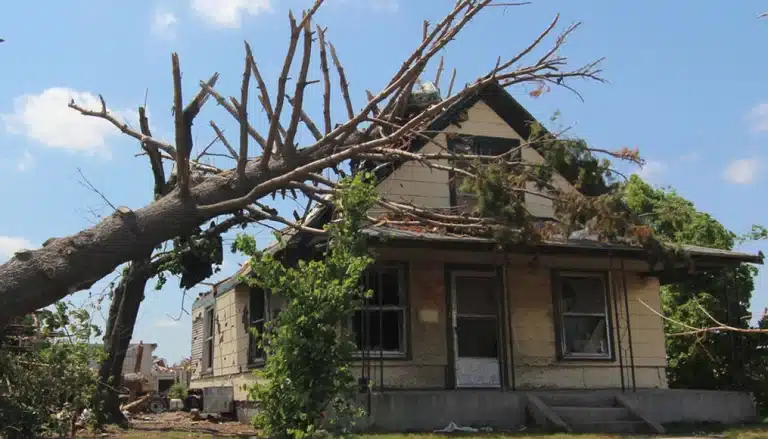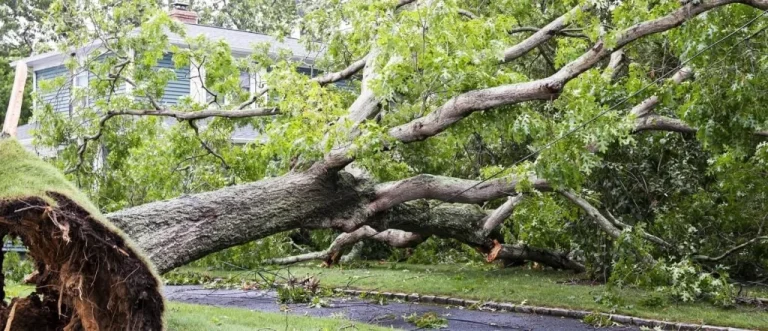Golf balls, baseballs, whatever you like. A hail storm can come out of nowhere and drive down pellets of all sizes onto your property.
It’s very easy to see how hail could cause damage to your home or car. While your homeowners insurance covers you from a lot of different types of weather, your auto policy may not. Let’s take a look at how both can protect you from hail.
Hail Damage to Your Roof or Home
A typical homeowners insurance policy includes hail as one of over a dozen covered perils. Dwelling coverage, a significant part of your plan, protects the physical structure of your home. It includes coverage from windstorms, which includes tornadoes and hail.
Hail can be pretty destructive. Larger pieces can ding gutters, dent siding and damage roofs. Due to the frequency and possible severity of these storms, hail damage claims are one of the most common homeowners insurance claims.
If you file a claim for hail damage, you’ll talk to an adjuster, who will survey the damage. If it’s determined your claim is valid, you’ll be covered up to your policy’s limit, minus your deductible, and refunded for home repairs.
Not all instances of hail damage require your insurer’s help, though. If the damage isn’t higher than your deductible, it probably isn’t worth it to file a claim.
Also, some companies in dangerous weather-prone areas could stipulate that if damage caused by hail is only cosmetic, your claim could be denied. In this scenario, only serious hail damage that affects the structural integrity or function of a part of your home is covered.
Does Car Insurance Cover Hail Damage?
If your car was in the driveway or street during an unexpected hail storm, it could easily become a casualty. Hail can crack a windshield, break a rearview mirror, or dent the body of your vehicle. Fortunately, hail damage to your car is likely covered if you have comprehensive auto coverage.
There are several forms of car insurance. While liability coverage is the only type required by law, this wouldn’t protect you from hail or any weather damage. Liability coverage only comes into play after you’ve been in an accident.
Comprehensive coverage protects your car from damage it can sustain while it’s parked. It guards against theft, vandalism, and severe weather, which includes hail. While comprehensive coverage isn’t mandated by law, a lender may require you to have it if you’ve leased or financed your vehicle.
If you have comprehensive coverage, your insurer will reimburse you for repairs after hail damage, minus your deductible. Again, if the damage amounts to less than or around your deductible, you may not want to file a claim.
Does a Hail Claim Increase My Premium?
In both homeowners and car insurance cases, a single hail claim may increase your rate. To what extent it goes up, if at all, depends on a few factors. However, filing multiple claims in a short period is almost always a problem.
A general rule of thumb is the more claims you file, the higher your insurance will be. A person who consistently files claims demonstrates an increased financial risk for an insurer, so it must up its price accordingly to offset this risk. Filing too many claims in a few months could even cause your provider to not renew or cancel your policy.
Homeowners Insurance and Hail Claims
It’s possible a single claim could increase your homeowners premium. In an insurer’s eyes, someone who files a claim is more likely to do it again. For homeowners insurance, certain claims are more significant than others, though.
Personal liability and theft claims can be especially influential on your rate. This is because a liability claim, like a dog bite, is more likely to happen more than once compared to a severe weather claim. Liability claims can also carry steep medical and legal costs that need to be covered.
It depends on your insurer, too. Some may be more lenient towards a weather claim than others since it was totally out of your control. If a company is seeing an increase in weather-related claims as a whole or operates in an area that is especially prone to hail, a single hail damage claim could cause a rise in your premium.
Car Insurance and Hail Claims
It’s possible your car insurance goes up after a hail claim. Comprehensive claims are usually less expensive than liability or collision claims, so your rate may not drastically go up. Some insurers also don’t raise rates at all after one comprehensive claim if it’s below a certain dollar amount or meets specific damage standards.
A surefire way to increase your rate is to file a lot of claims. You’ll want to avoid this if possible. As mentioned previously, it could be more cost-effective to pay for some hail damage out of pocket if it’s less than or around your deductible amount. For example, if dents in your hood after a hail storm cost $600 to fix and your deductible is $500, it would be wise to not file a claim.
Your insurance would only cover $100 worth of the cost after you pay the deductible, and the claim could possibly raise your rates going forward. Instead, you could pay completely out of pocket, which would only cost $100 more than if you got insurance involved, and you won’t risk your premium being affected.
Also, if the damage doesn’t compromise the car, you can save money over time and get it repaired when you’re ready. Your car insurer might require you to file a claim in a certain amount of time after damage occurs, so you would have to pay your deductible in this time window when you file. If you elect to pay out of pocket, you can pay when you feel comfortable or can afford it.
The editorial content on Clovered’s website is meant to be informational material and should not be considered legal advice.




